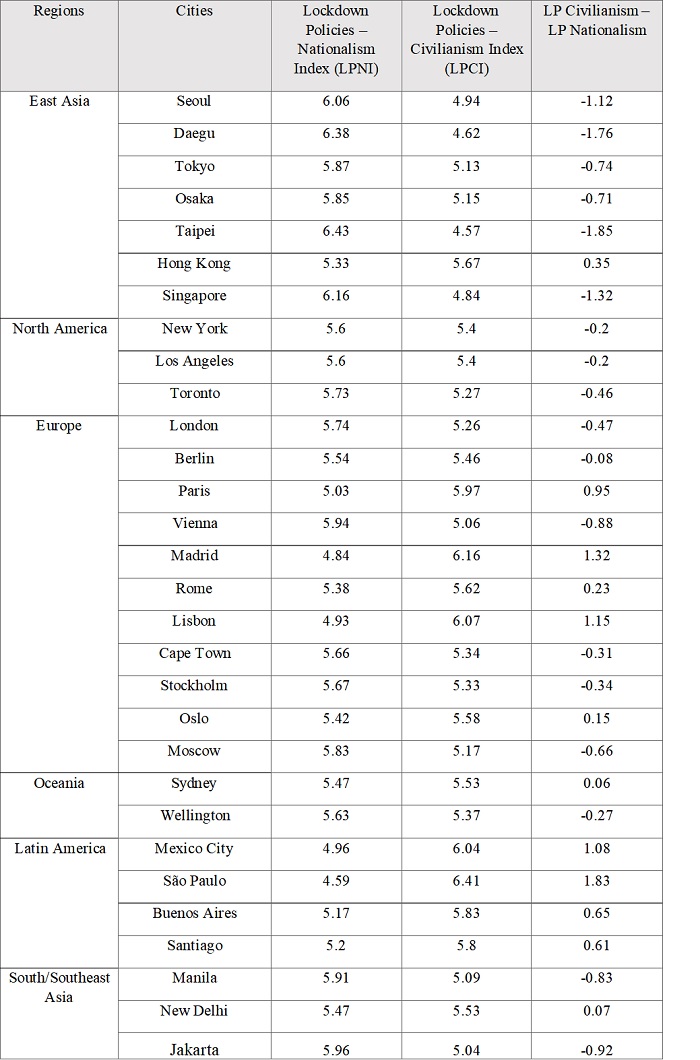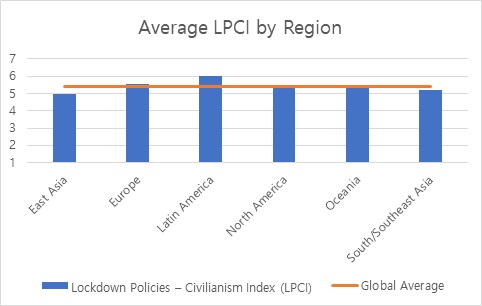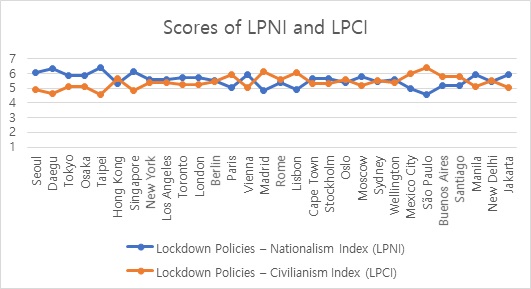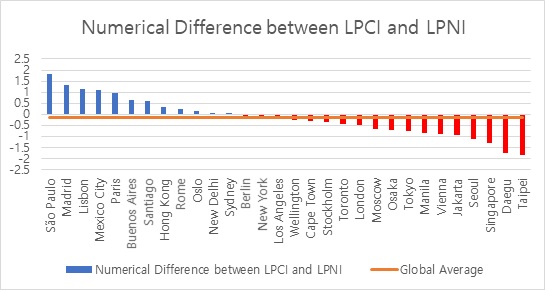Impact of Lockdown Policies During the COVID-19
1.
Background
COVID-19
data analysis 5 series will focus on how emergency measurements during the
COVID-19 influence the nationalism around the world. To illustrate, we will
analyze the survey results of opinions of global citizens whether they perceive
a certain policy will lead a country to nationalism or citizens’ cooperation.
International cooperation is occasionally disturbed by countries with strong
and offensive nationalism, and sometimes, even a central government cannot
control the national outrage triggered by nationalistic sentiment. Even worse,
irrational nationalism would bring about racism and xenophobia, which severely
undermines the free and open market around the globe. On the contrary,
cooperation among citizens and governments would enhance the effectiveness of
abating the crisis and it will help fast recovery from an emergency to everyday
life.
When
China announced it was shutting down Wuhan, the center of the coronavirus
outbreak, in an attempt to deter the further spread of the disease, the
international society was astonished and shocked. However, when the virus hit
the European continent, many countries decided to implement the same measure as
well, such as Italy, France, and Spain, have tried to flatten the peak number
of infected people and reduce immediate pressures on the health system. On the
contrary, some states like Denmark, Norway, and the Netherlands were against a
complete lockdown to limit economic and social impacts. Strict
lockdown policies were consistent with reducing the spread of the virus in some
countries (e.g., France, Italy, Spain, and the United Kingdom). However, such
measures are very disruptive to the economy and social life and risk losing
public support in the long term.
2.
Research
Topic
In the middle of the COVID-19 pandemic, it
is of importance for a government to make a rapid measurement to fight against
the virus. However, it is also of equal significance to think of ramifications
of the emergency policies and people’s support. This section will analyze how
global citizens see the lockdown policy, especially how they assess the
lockdown measure’s influence on a country’s nationalism and civilianism during
the COVID-19 crisis.
3.
Questionnaire
Used
Survey Question II-7: “While fighting
against a global pandemic like COVID-19, a country may begin to follow either a
state-centric and chauvinist path, or a democratic path based on citizen
participation. In terms of lockdown policies, what direction do you expect the
following policies/trends to take?”
The answers consist of a 10-point scale,
with higher scores indicating an individual believes the policy will lead
citizens to democratic/participatory citizenship and lower scores demonstrating
a person acknowledges the measure will result in citizens’
state-centric/chauvinistic.
4.
Major
Outcomes
Table 1: Lockdown Policies –
Nationalism Index (LPNI) and Lockdown Policies – Civilianism Index (LPCI)
by Citizens of 30 Global Cities

Respondents are asked to choose one score
to represent their ideas on the question, and the average scores of each city
indicate the Lockdown Policies – Civilianism Index (LPCI). It demonstrates how
much do citizens of a city consider the lockdown policy will cause citizens’
cooperation and participation amid the crisis, and the higher the score is, the
more individuals think highly of the policy. Meanwhile, the reverse scaling was
used in the Lockdown Policies – Nationalism Index (LPNI), which means that 11
minus LPCI is the LPNI. Similarly, the higher the LPNI score is, the more a
citizen speak ill of the policy under the democratic and liberal principles. Finally,
the numerical differences between the two scores were calculated in order to
show which side a city is putting more significance. To illustrate, the higher
a numerical difference is, the more citizens of the city underscore the
above-mentioned policy in the course of the pandemic crisis.
Table 2: Average Lockdown Policies – Civilianism Index (LPCI) by Region
|
Regions
|
Average Lockdown Policies - Civilianism Index (1 –
10)
|
|
East Asia
|
5.00
|
|
Europe
|
5.55
|
|
Latin America
|
6.03
|
|
North America
|
5.36
|
|
Oceania
|
5.45
|
|
South/Southeast Asia
|
5.22
|
The scores in the
table are the average Lockdown Policies – Civilianism Index (LPCI) of the
global citizens by region. To be specific, the lowest score of 5.00 was rated
by East Asian citizens on average. It exhibits that people in this region least
likely to deem that the lockdown policy will bring about civilianism at a time
of crisis. On the contrary, the highest score of 6.03 was rated by Latin
American citizens, which illustrates that people here are most likely to highlight
a certain policy and believe the measurement would lead to citizens’
cooperation in society.
Figure 1: Bar Graph of Average Lockdown
Policies – Civilianism Index (LPCI) by Region

Figure 1 is the
visualized graph of Table 2, and the orange line is the world average Lockdown
Policies – Civilianism Index (LPCI). That Latin American and European citizens
think positively of the lockdown policy is evidenced by the figure. On the
other hand, East Asia, South/Southeast Asia, North America, and Oceania’s
average LPCI scores are under the global average, implying that these regions
are not accentuating the policy compared to the other two continents. These are
generalized scored by region, and therefore, for more detailed analysis, let’s
see each city’s score of LPCI and LPNI.
Figure 2: Line Graph of Lockdown
Policies – Nationalism Index (LPNI) and Lockdown Policies – Civilianism Index (LPCI)

This figure is a visualized version of
Table 1, and the most
outstanding finding of Figure 2 is that the line is fluctuating and there is no
eminent trait in the graph. Nonetheless, all East Asian countries, except Hong
Kong, are showing a negative reaction towards the lockdown policy, whereas
Latin American cities are presenting a positive attitude on the lockdown
measurement. Meanwhile, other cities are holding divergent opinions regarding the
local and state lockdown.
Figure 3: Bar Graph of Numerical Difference
between Lockdown Policies – Civilianism Index (LPCI) and Lockdown Policies –
Nationalism Index (LPNI)

The differences
between LPCIs and LPNIs are drawn as a bar graph, shown in Figure 3. The orange
bar indicates the global average difference score (-0.15). The negative number
of the global difference score implies that generally speaking, people around
the world do not think that the lockdown policy will have a positive impact on
national and international society. To be more specific, cities with negative
numerical differences are marked with red bars, indicating citizens of that
city believe that the lockdown policy will lead a country to nationalism and prevent
cooperation among people and states; yet, cities with blue bars express that the
lockdown policy is effective in a way of slowing the spread of the disease and
protect public health. These cities are including Sao Paulo, Madrid, Lisbon,
Mexico City, Paris, Buenos Aires, Santiago, Hong Kong, Rome, Oslo, New Delhi,
and Sydney.
5.
Summaries
and Further Tasks
a.
Data
analysis shows contradicting views on the lockdown policy by global citizens.
b.
Latin
American cities highly believe that the lockdown measurement will lead a
country to civilianism rather than nationalism. Also, Europe’s average score is
above the global average as well; however, different cities are showing different
positions regarding the issue.
c.
East
Asian cities, except Hong Kong, are expressing the negative attitude towards
the lockdown policy, believing that the measurement will lead a country to
nationalism.
d.
The
study is limited to descriptive research, and therefore, a more detailed
explanative investigation is required to further understand the global citizens’
consciousness presented above. For instance, why citizens in Hong Kong think
highly of the lockdown policy, unlike other East Asian cities? Why do Latin
American citizens think that the lockdown policy will lead a state to
civilianism?
|